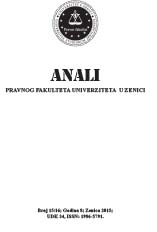Ka reafirmiranju sofističkog učenja o prirodnom pravu
TOWARDS REAFFIRMING SOPHISTIC LEARNING ABOUT NATURAL RIGHTS
Author(s): Spahija KozlićSubject(s): Ancient Philosphy, Philosophy of Law
Published by: Pravni fakultet - Univerzitet u Zenici
Keywords: natural law; justice; physei dikaion; nomoi dikaion; sophists; philosophy of law; the value of the law;
Summary/Abstract: Despite the domination of legal positivism (especially in the second half of the nineteenth and early twentieth centuries) the dispute between justice by nature and justice under the law initiated by the ancient Greek sophists has always been present in various forms of axiological debate about the law in its historical and philosophical sense. Transcending the mythical notions of justice and law in the figures of the goddesses Themis and Dike, Dike in particular - hence dikaion represents justice with two faces: one means retribution and punishment while the other protects the fairness, sophists leave to the latter theorists of law the task to discuss on starting points of the social norms shaped in the concept of nomos. According to mythological tradition opponents of Dike or eris are dispute which disturbs order (Dysnomia - Lawlessness), then bia symbolizing the force opposite righteousness and finally hybris representing excesses / immoderate life. For Protagoras the core meaning of citizen (polites) relates to everyone who has some kind of criteria of the concept of goodness which can’t be judged by no means by an individual (idiotes) while community of citizens (polis)defines the criteria needed for grasping the concept of righteousness (nomos). Sophists are more relevant for this topic because of their knowledge and understanding of the concept of natural rights (physei dikaion), particularly due to their position that is opposed to nomos or nomoi dikaion. These are, above all, Hippias, Antifont, Thrasymachus and Callicles. Hippias, for example, believes that earthly laws tyrannize men and force them to actions which are contrary to the nature of justice which leads to inequalities in the community. The argument for the injustice of earthly laws is in their frequent variability because justice, per definition, should be stable. Because of that these laws are not binding for the wise who live according to the principles physei dikaion. Furthermore Antifont understood physei dikaion as an order of full equality (isonomy) which is usually in conflict with the artificial standards which focus is inequality. Thrasymachus is even more radical and believes that the might create earthly laws for their own protection. The purpose of this work, in this regard, tends to reaffirm the ancient (especially Sophist) remarks about the importance of out-of-standard norms needed for interpretations of standards.
Journal: Anali Pravnog fakulteta Univerziteta u Zenici
- Issue Year: 8/2015
- Issue No: 15-16
- Page Range: 53-77
- Page Count: 25
- Language: Bosnian

